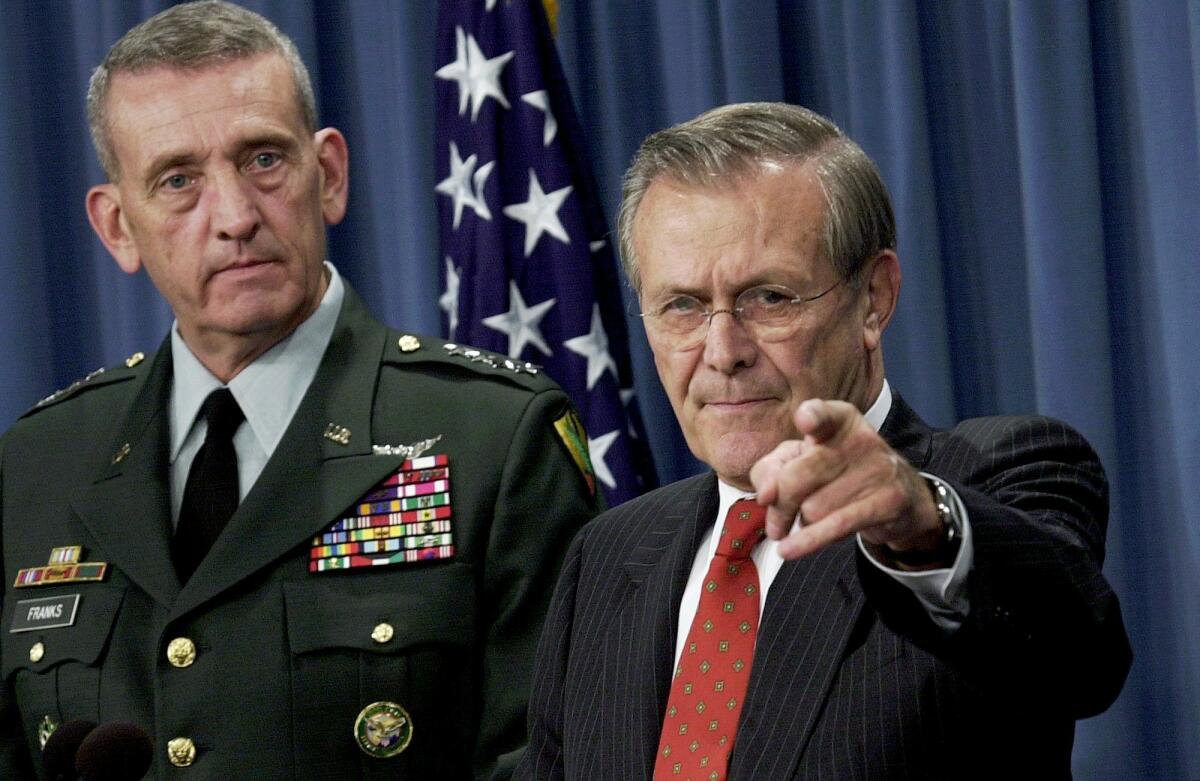Op-Ed: If France wants to succeed against Islamic State, it should study the U.S. invasion of Afghanistan

Secretary of Defense Donald Rumsfeld calls on a Pentagon reporter during a briefing on the ongoing military operations in Afghanistan as General Tommy Franks, the field commander for the operations, listens on Nov. 15, 2001.
- Share via
The wisdom of the U.S. decision to keep troops in Afghanistan on a semi-permanent basis will be long debated. What is beyond debate is the brilliance of the post-9/11 invasion, which holds lessons for the French people following the massacres of Nov. 13 in Paris and the similarly appalling loss of life in the former French colony of Mali on Nov. 20.
After 9/11, instead of opting for the kind of knee-jerk bombings that had too often been ordered by the Clinton administration after Al Qaeda attacks against U.S. embassies and the destroyer Cole, the Bush administration (or, more truthfully, the Department of Defense led by Donald H. Rumsfeld) moved carefully, devising one of the more innovative military campaigns in modern American history.
This is France’s fight, first and foremost. Islamic State has made it so.
There was almost an eeriness about the U.S. global response in the days after 9/11. We saw none of the usual attempts at immediate vengeful gratification — the path France has chosen to satisfy the demands of its rightfully outraged people. Instead, the Defense Department embodied an attitude that essentially said, “We will choose the time and place of our reprisal; and it will be fearsome.” Initially, Al Qaeda leaders took this as a sign that America had been struck so badly that it could not muster a coherent response. Far from it.
Ordered to go after Al Qaeda’s bases and target its leaders in Afghanistan, the leader of U.S. Central Command, Gen. Tommy Franks, came back to Rumsfeld saying that he could be ready to invade in six months. Understandably exasperated, Rumsfeld replied, “I want men on the ground now!”
But this did not mean a conventional force, much less massive airstrikes.
Instead, a plan was devised to insert U.S. special forces and intelligence units into Afghanistan within days of the 9/11 attacks. These units established contact with anti-Taliban and anti-Al Qaeda groups and tribes among the Afghan people, most notably the collection known as the Northern Alliance. The images of these brave Americans at work are now familiar: bearded and riding horseback beside their Afghan allies, they moved about the country, precisely identifying targets to be struck by American air power.
This process went on for several weeks, until the United States formally launched Operation Enduring Freedom on Oct. 7. Only then did we see the extent to which patient and dangerous groundwork had paid off. Perhaps the most notable images were of our delighted Afghan partners watching in awe as the U.S. Air Force — notoriously the most imprecise of American military arms — actually hit the targets it was supposed to, which had been laser “painted” by our men on the ground.
The action won for the U.S. an enormous store of faith among Afghans; and although that store was soon to be squandered by George W. Bush’s foolhardy attempt (later repeated with even more disastrous results in Iraq) to occupy and “democratize” Afghanistan, that squandering must not obscure the brilliance of the attack itself.
That attack is what the French armed forces must adopt as a model. As we have seen, France has many citizens that can pass in and out of Syria; this can be used to France’s advantage. France ought to quietly embed special forces troops of Muslim background into those sectors of Islamic State-contested Syria that still contain large numbers of displaced but not yet refugee citizens. These troops could join or replace small groups of U.S. special forces, who are less ideally suited by background to the work at hand. Their courage bolstered, Syrian dissenters will doubtless prove willing guides, pointing out where French missile strikes should fall and where an eventual French conventional action might take place, should that ever prove wise.
This is France’s fight, first and foremost. Islamic State has made it so. In addition, France has a long history in both Mali and Syria as a colonial power, usually an unhappy one, as Islamic State-inspired operatives remember only too well. For example, in the aftermath of the World War I, when French Gen. Henri Gouraud took formal control of Damascus from the British, he went to the tomb of Saladin (the great Muslim victor over the Christians in the Third Crusade) and stupidly announced, “Saladin, we have returned. My presence here consecrates victory of the Cross over the Crescent.”
Unlike most Western young people, young Muslims have a very informed and vivid historical awareness: The bewilderment of so many commentators as to why France should have been selected for the Nov. 13 attacks is in itself bewildering. But France, if it now remembers the U.S. invasion of Afghanistan (and omits the subsequent mistake of trying to maintain a long-term military presence in that country) can undo much of the damage done by its past actions.
This will mean immediately suspending bombing missions in favor of patience, deliberateness and cunning. These are the weapons that France’s enemies are displaying, and they must be answered in kind.
Caleb Carr, author of “The Lessons of Terror: A History of Warfare Against Civilians,” is a military historian who frequently writes and lectures on matters of military and security policy, particularly terrorism.
Follow the Opinion section on Twitter @latimesopinion and Facebook
More to Read
A cure for the common opinion
Get thought-provoking perspectives with our weekly newsletter.
You may occasionally receive promotional content from the Los Angeles Times.






